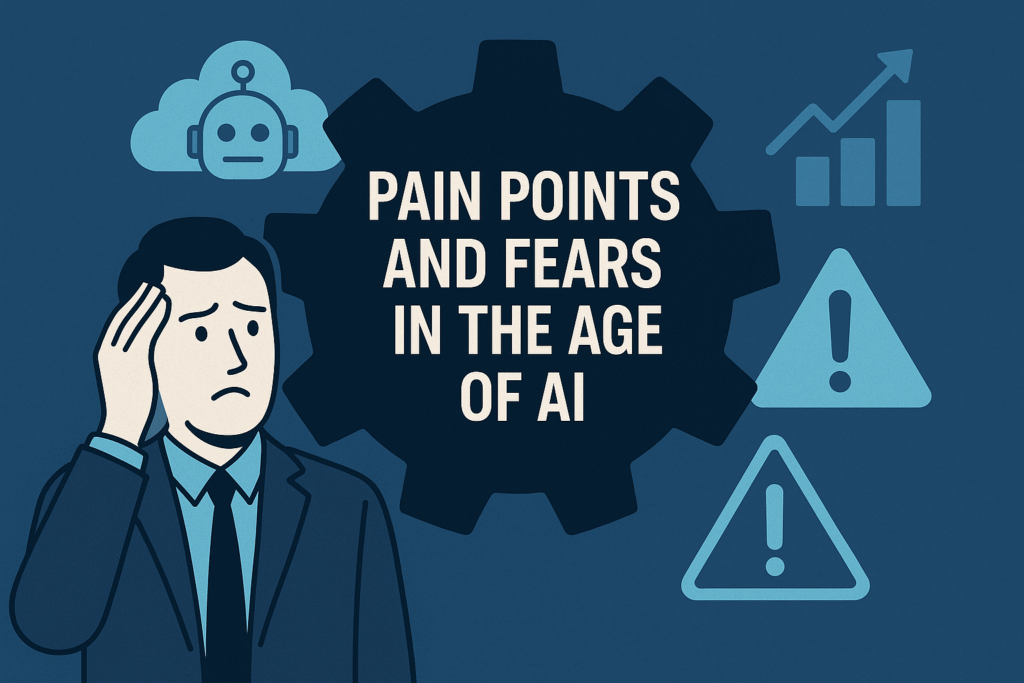


Financial advisors are standing at a crossroads. On one side, artificial intelligence (AI) promises unprecedented efficiency, automation, and insights. On the other, it sparks fears about being replaced and losing the human touch that clients value. So, will AI replace you? In this series, we’ll explore the pain points advisors face with the advent of AI, the common fears in the industry, and how advisors can leverage their uniquely human strengths to stay ahead of the robots. We’ll dive into the latest data on AI’s progress, future scenarios for wealth management, and practical ways to integrate AI into your workflow. Throughout, one theme will shine through: the human element in financial advice is more crucial than ever, and when paired with smart technology, it’s an unbeatable combination.
In just the past couple of years, AI has exploded onto the scene in wealth management. The launch of generative AI models like OpenAI’s GPT-4 (powering ChatGPT) in 2023 kicked off a wave of experimentation in the industry. Large firms and independent advisors alike began testing AI for everything from automating paperwork to answering client questions.
What was once hype is rapidly becoming mainstream.
85% of advisors now say generative AI is a “help” to their practice, up from just 64% in 2024. and over three-quarters (76%) report “immediate benefits” after using AI tools. Clearly, attitudes are shifting, and fast.
In fact, a whopping 91% of advisors surveyed are now using Gen AI tools in some capacity (only 9% said they don’t use them at all). What are they using AI for? Mainly number-crunching and time-saving tasks: advisors report using gen AI for things like predictive analytics, marketing content creation, and summarizing meeting notes. However, there’s still hesitation around more core advisory tasks. Only about 29% of advisors said they use AI to develop personalized financial plans, in part due to compliance concerns and a preference for hands-on control in client-facing work. In other words, advisors are embracing AI as an assistant for analytics and administration, but the human advisor remains in the driver’s seat for delivering actual advice.
Behind the scenes, wealth management firms are rapidly rolling out AI-powered systems. Many larger institutions see AI as a competitive edge and are investing accordingly. For example, Morgan Stanley has collaborated with OpenAI to embed GPT-4 into its workflows, deploying an internal chatbot that 98% of its advisor teams now actively use for quick research and information retrieval. By simply asking the AI, Morgan Stanley advisors can instantly search a vast internal knowledge base instead of manually digging through documents.
JPMorgan Chase and Royal Bank of Canada have begun equipping their advisors with AI-powered tools as well. CRM giant Salesforce introduced “Einstein GPT” for financial services, aiming to help advisors automate tasks like data entry, portfolio monitoring, and client communications. Across the industry, there’s a recognition that AI can streamline and expedite a wide range of processes – from analyzing market data, to generating client reports, to personalizing marketing – ultimately helping advisors work more efficiently.
Despite the optimistic headlines, it’s natural for advisors (especially solo practitioners and smaller RIAs) to feel a bit uneasy about AI. Change is hard, and the wave of “AI everything” has introduced some very real pain points and concerns in advisory firms.
Ever since robo-advisors emerged a decade ago, advisors have worried that algorithms might make human advisors obsolete. The fear resurfaced with gusto when ChatGPT burst onto the scene, demonstrating human-like abilities to answer financial questions. In a Financial Planning survey, 31% of advisors said AI and machine learning were a “large concern” impacting their firm in the year ahead. The good news is that most experts don’t see wholesale replacement happening (87% in that same survey expected AI’s impact to be positive, not destructive).
Robo-advisors didn’t eliminate humans, and generative AI isn’t poised to either, at least in the near term. We’ll discuss the enduring human advantages shortly.
Another pain point is simply overwhelm. It feels like new AI tools for advisors are popping up every week – note-takers, writing assistants, chatbot plugins, analytics platforms – each promising to revolutionize your practice. The sheer number of these tools can fuel fear and paralysis. Which ones are actually useful? How do you choose and implement them? Many asset managers (and smaller firms) are holding back on AI precisely because of uncertainty around data integrity, accuracy, and how to integrate these tools into existing workflows.
The lack of integration is a valid gripe: for the third year in a row, advisors cite “bad data and a lack of integrated tools” as top technology concerns. No one wants an arsenal of fancy AI apps that don’t talk to each other or to your CRM, as that just creates more work.
Relatedly, advisors worry about keeping client data safe. Using an AI tool might mean uploading client notes or data into the cloud. Firms are rightly asking: where is that data going, who can access it, and is it encrypted? If you use ChatGPT, for instance, any data you input could potentially train the model (unless you have a private instance). This has led firms to set strict rules – again, 82% have formal AI usage policies now to ensure advisors only use approved tools that meet security standards.
Advisors have spent decades establishing trust as humans who deeply understand their clients. A subtle fear is that leaning on AI might erode some of that personal trust. Some clients might love the tech-savvy, but others might be skeptical or uncomfortable. On the flip side, there’s fear of the opposite – that clients might bypass advisors in favor of AI tools. This is especially noted with younger tech-native generations. Surveys show 67% of Gen Z and 62% of Millennials are already using AI tools to help manage their finances (budgeting, saving, and even investment ideas). And 98% of those young users report positive experiences! The ease and instant answers AI provides could tempt some people to DIY their financial questions.
Solo RIAs and mid-size firms may also fear falling behind larger competitors in the AI race. When you read that Morgan Stanley’s advisors have a custom AI assistant and automated meeting notes, or that big fintech vendors are rolling AI into their platforms, it’s easy to think, “How can I, with a lean team and budget, keep up?”. The concern is that without similar tech, smaller firms might appear outdated and lose clients to more high-tech advisors.
There’s some truth here: technology can be a differentiator. In fact, more than half of advisors (57%) in one survey said they’ve won new clients because a competing advisor had “bad technology. Conversely, 85% of advisors who pride themselves on having state-of-the-art tech said they’ve specifically won clients by showcasing those tech capabilities against an old-school competitor.
So yes, not embracing new tools could gradually become a competitive disadvantage.
Humans crave a human connection when it comes to their money and their future. No matter how advanced AI becomes, it lacks the very qualities that make advisors indispensable: empathy, personal understanding, ethical judgment, and the ability to build trust.
A recent nationwide study found that most Americans trust a human financial advisor over an AI for virtually every important task – from creating a retirement plan to managing investments. For example, when asked who they trust more for developing a tailored financial plan, 53% chose a human advisor vs. only 15% who trust AI more (the remainder either trust both equally or aren’t sure). Similar margins emerged for investment management and retirement planning. The message is loud and clear: clients want the human touch in critical financial matters.
As Northwestern Mutual’s Chief Strategy Officer put it, “Financial planning isn’t just about numbers on a spreadsheet – it’s an emotional discussion around a person’s life goals. These conversations are complex, delicate, and deeply personal. Clients want to discuss their options with a trusted financial advisor who understands their needs … at a human level.”.
That insight perfectly captures the human advantage. You, as an advisor, can listen to a client’s hopes and fears, understand the nuance of their family dynamics, their career aspirations, and their anxiety about market volatility, and then coach them through decisions with compassion and wisdom. An AI might output a technically optimal plan, but it can’t read the room or sense the client’s unspoken concerns. It won’t hold a client’s hand through a market crash and provide reassurance in the way a human can.
Crucially, AI lacks accountability and ethical intuition. It will cheerfully provide an answer or recommendation, but it won’t take responsibility if that advice goes wrong. Human advisors stand behind their advice and navigate the moral and ethical context of client situations. We also know our clients’ unique circumstances in a way a general AI cannot. For instance, understanding that a seemingly “optimal” strategy might conflict with a client’s personal values or comfort level. As CFP Board’s interim Managing Director Michael Donnelly, CFP®, stated, AI can enhance efficiency and free up time, but “it cannot replace the personalized, nuanced advice provided by a human advisor.”
Let’s not forget the behavioral coaching aspect of your profession. Numerous studies (e.g., the Vanguard Advisor Alpha framework) have noted that one of an advisor’s greatest values is preventing clients from making emotional mistakes, like panic selling in a downturn or chasing fads. A chatbot might supply information 24/7, but will a nervous client actually listen to it in a crisis? Unlikely. They want to call you, the advisor who knows them, for perspective and calm. The trust and rapport you build with clients creates a powerful emotional safety net that no algorithm can match.
Even younger investors who happily use fintech apps recognize the need for human guidance. In fact, they often want the best of both worlds. A recent 2025 survey found that 47% of Americans (and over 50% of Gen Z and Millennials) would prefer to work with a human advisor who uses AI tools – rather than an advisor who doesn’t use AI, or AI alone.
The up-and-coming generation appreciates technology (quick answers, slick portals, etc.), but they still value having a real advisor at the helm. The human relationship augmented by technology is the winning combo.
Your role as a human advisor is here to stay. If anything, it’s about to become even more valuable because of AI. As simple tasks get automated, the human element becomes the differentiator. Clients will gravitate toward advisors who provide exceptional empathy, understanding, and ethical guidance – qualities no machine can truly replicate. By embracing that reality, you can approach AI as a tool to enhance your practice, not a threat to your existence.